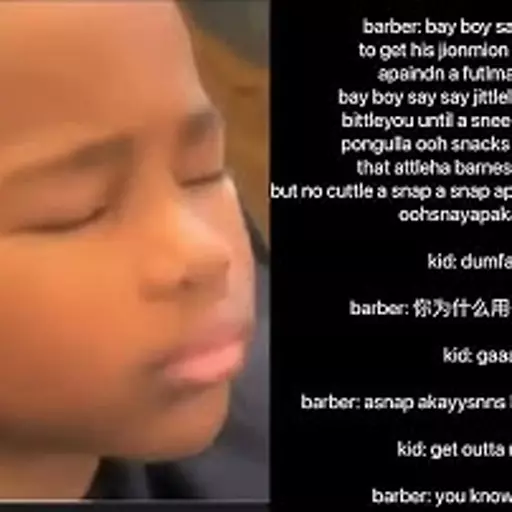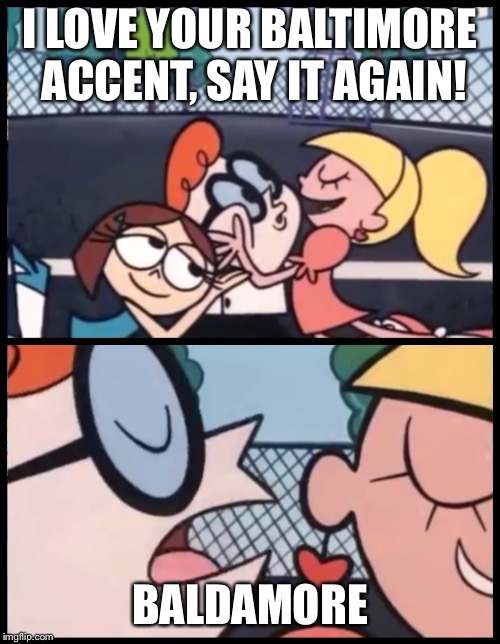Jittleyang & Fuhuhluhtoogan: Viral Baltimore Slang On TikTok!
Are you a "jittleyang" or a "fuhuhluhtoogan"? This seemingly nonsensical question has taken the internet by storm, catapulting two obscure Baltimore slang terms into the heart of viral trends and meme culture, proving that language, even in its most unconventional forms, can captivate and connect.
These two words, "jittleyang" and "fuhuhluhtoogan," are not just random collections of syllables; they represent a fascinating intersection of language, identity, and the ever-evolving landscape of social media. They emerged from the vibrant, yet often overlooked, dialect of Baltimore, a city known for its unique character and a distinct way of speaking. Their journey to viral fame, however, is a story of music, memes, and the power of the internet to transform the obscure into the ubiquitous.
The genesis of this linguistic phenomenon lies with Richard Webster, a Baltimore barber and rapper who goes by the moniker "Bippleyipsnipp." His artistic endeavors, particularly the "Baltimore accent song," served as the foundation upon which "jittleyang" and "fuhuhluhtoogan" would rise to prominence. The song, a playful exploration of Baltimore's unique vernacular, unintentionally became the catalyst for a cultural phenomenon, introducing the terms to a wider audience and setting the stage for their viral ascent.
Webster, through his music, inadvertently tapped into a vein of cultural fascination. The Baltimore accent, often described as a blend of Southern, Mid-Atlantic, and working-class influences, has a distinct rhythm and a set of pronunciations that set it apart from the more generalized American accents. While it might not be as widely recognized as other regional dialects, the Baltimore accent holds a special place in the city's identity, representing its history, its people, and its unique character. The song and its subsequent viral spread, were the launchpad for the Baltimore accent and words within.
The trajectory of "jittleyang" and "fuhuhluhtoogan" mirrors the modern evolution of online trends. The initial spark came in 2021, but the fire truly ignited in 2023, propelled by the relentless engines of Instagram and TikTok. Memes and reactions began to proliferate, transforming these words into something far beyond their original context. People began using the terms in various contexts, using them to indicate something is cool, something is bad or in some situations as a greeting, and in all the situations the words have very different meaning. The question, "Are you a jittleyang or a fuhuhluhtoogan?" became a kind of personality test. This simple query became an invitation to engage in a playful exchange, a coded way of assessing a person's familiarity with the internet culture. It was more than just slang; it was an instant identifier of internet fluency.
The transformation of these words into a widespread meme shows a broader trend, where obscure language is integrated with internet culture. The viral success also touches on issues of cultural appropriation, with critics pondering the ethics of taking words from an accent. The terms, however, don't appear to have much of a context, and rather their success is in the cadence, and the meaning is left to the individual.
On July 23rd, 2021, TikTok user @t0ps0unds posted a video with the caption "Somebody from Baltimore translate," which quickly garnered over 7,000 plays in two years. This initial curiosity illustrates how the internet can act as a magnifying glass, amplifying regional dialects and encouraging cross-cultural dialogue. This is what happened to the Baltimore accent.
The Baltimore accent itself, while a defining characteristic of the city, is surprisingly rare among residents. Many speak with a generic American accent or a more vague Mid-East Coast inflection. However, those with a thick Baltimore accent often serve as ambassadors of the city's unique linguistic identity. This disparity is an interesting part of the appeal of the accent on the internet.
The meme's impact extends beyond simple entertainment. It has created a sense of shared identity and belonging, particularly for those who recognize the references. The words' inherent playfulness makes them readily adaptable to various scenarios, and theyve become part of an ongoing conversation about language, identity, and the evolving nature of online communication.
The enduring charm of "jittleyang" and "fuhuhluhtoogan," with their roots in Baltimore's unique dialect and their rise on social media, demonstrates the power of niche dialects to capture the global attention. The Baltimore slang has transcended its origin and become a cultural touchstone for the meme generation, embodying a unique form of social identity.
| Category | Details |
|---|---|
| Full Name | Richard Webster |
| Known As | Bippleyipsnipp |
| Occupation | Barber, Rapper |
| Origin | Baltimore, Maryland |
| Key Contribution | Popularized the slang terms "jittleyang" and "fuhuhluhtoogan" through his music, specifically "Baltimore accent song." |
| Viral Fame | His song went viral in 2023, with the terms gaining meme attention on Instagram and TikTok, primarily via the question: "Are you a jittleyang or a fuhuhluhtoogan?" |
| Start of Popularity | 2021 (initially with his music), with widespread popularity in 2023-2024 |
| Reference | Example Website Reference (Replace with actual reference link) |
The phenomenon highlights the way the internet allows for the unexpected popularization of different forms of language, as well as the adaptability of language within different situations. The words may have started in the Baltimore accent song, but their proliferation is their own story.


